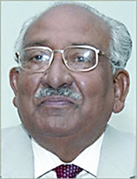Rahman, M Saifur
Rahman, M Saifur (1932-2009) a professional chartered accountant, politician. Saifur Rahman was born on 6 October 1932 at village Baharmardan in sadar upazila of Maulvibazar District. His father was Abdul Basit and mother Talebunnessa. Saifur Rahman passed matriculation examination from Moulvibazar Government High School in 1949, Intermediate from Sylhet Murari Chand College in 1951 and obtained his graduation from Dhaka University in 1953. Later he studied in London (1953-58) and became a fellow of the Institute of Chartered Accountant (England and Wales). In 1962, Saifur Rahman took Advanced Management Training from the United Kingdom. He became a specialist in Monetary, Fiscal and Development Economics.

While a student in Dhaka University Saifur Rahman joined student politics, and was a vice-president of Salimullah Muslim Hall union. He took active part in the Language Movement and suffered a month long imprisonment for his participation in the movement.
Saifur Rahman was nominated to the Pakistan National Wage Commission as the lone member from the private sector in 1969. He was a member of Bangladesh National Wage Commission in 1973 and in 1975.
Saifur Rahman was appointed Adviser to the military government of ziaur rahman in 1976 in charge of the Ministry of Commerce. In 1977, he joined Jatiyatabadi Ganatantric Dal, the political coalition forged and later converted into bangladesh nationalist party (BNP) by President Ziaur Rahman in 1978. He was elected a member of Jatiya Sangsad in 1979 as a nominee of Bangladesh Nationalist Party from Moulvibazar sadar constituency. He was the Commerce and Finance Minister in the cabinet of President Ziaur Rahman from 1979 to 1982, and technocrat Finance Minister from 1991 to 1996. He is best known for introducing free market reforms to Bangladesh, a process that began in the late 1970s. He was elected member of the Jatiya Sangsad in 1996 and was again elected member of the Sangsad in 2001. He was the Finance and Planning minister in the cabinet of begum khaleda zia from 2001 to 2006.
Saifur Rahman as a Finance Minister introduced VAT (value added tax) for the first time in Bangladesh in 1992 as a part of expanding the tax net, and made major banking reforms in early 1990s. He also introduced floating exchange rate, liberalized trade, privatized State-Owned Enterprises (SOEs), and planned introduction of the Food for Education Programme while he was Finance Minister in 1991-96.
Saifur Rahman led the Bangladesh finance and commerce delegations to European Economic Community (EEC), Economic and Social Commission for Asia and the Pacific (ESCAP), Commonwealth and United Nations Conference on Trade and Development (UNCTAD) for different terms between 1980 and 1996. He represented Bangladesh in the Non-Aligned Movement (NAM) summit held in Columbia in 1995 and also headed the Bangladesh delegation to the Organisation of the Islamic Conference (OIC) in Bosnia in 1995. He was the Bangladesh's governor of the World Bank, the Asian Development Bank (ADB), the Islamic Development Bank (IDB) and the International Fund for Agricultural Development (IFAD). He presided over the golden jublee conference of the World Bank and International Monetary Fund (IMF) held in Madrid in 1994 as an elected governor.
Saifur Rahman, in his long professional career from 1962 to 1996, founded Rahman and Rahman Haque, a leading audit firm of the country with international standard. He also served as a consultant to many national and international organizations on Chemical, Oil and Gas, Transportation, Banking and Insurance. He was the president of Institute of Chartered Accountants of Bangladesh (ICAB), principal of Bangladesh Institute of Law and International Affairs and president of Bangladesh Jatisangha Samiti.
Saifur Rahman was awarded Ekushe Padak in 2005 for his role in the language movement. Saifur Rahman wrote his autobiography titled Kichhu Katha Kichhu Smriti (Some talks, Some Reminiscences) in 2009, where he disclosed several untold issues on his personal and political life along with the political system and politicians of Bangladesh.
M Saifur Rahman died in a road accident at Ashuganj of Brahmanbaria district while he was travelling from Sylhet to Dhaka by road on 5 September 2009. [Urmee Hossain]
